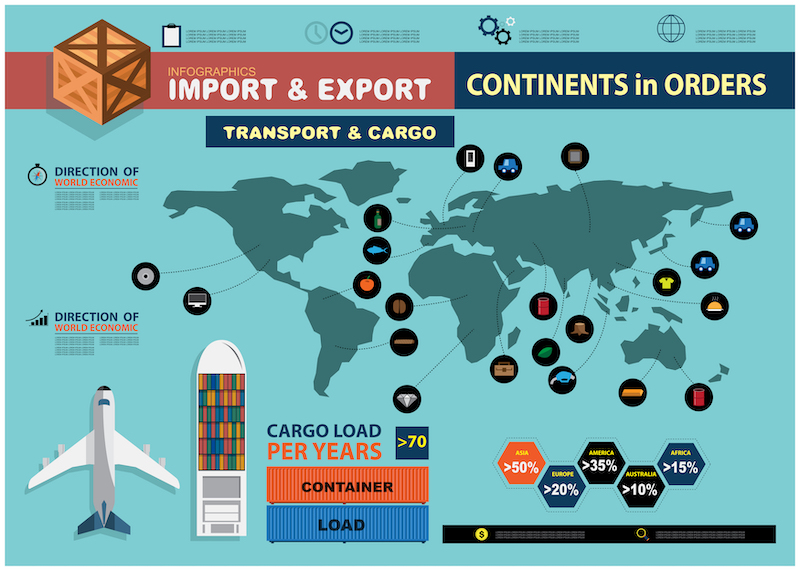
 IINO san
IINO san Please listen to the contents!
Incoterms DDP and DDU are the so-called door-to-door arrangements of trade terms. In the transaction of the trade, there are many ways to arrange your trade terms.
We need to clarify who will arrange the logistics and take the costs and risks on the export and import sides.
As a forwarder in Thailand, I prefer logistics that we can control, so we frequently arrange DDP and DDU, compared with EXW and FOB.
 Neko-senpai
Neko-senpai I’ll explain the general rules this time!
 Seagull Senpai
Seagull Senpai A lot of things have changed in Incoterms 2020, so I explained it in another article.
[Related Videos] DAP/DPU/DDP in Incoterms 2020 explained.
 Professor Lion
Professor Lion Here is the latest information.
What is DDP?

DDP stands for Delivered Duty Paid and is one of the Incoterms, a type of trade terms.
It refers to the terms of trade in which the exporter bears the freight and transportation cost to the destination and insurance. It is included in a group of terms called Group D in Incoterms.
Characteristics of DDP
DDP is the biggest responsibility of the 11 Incoterms for exporters and the least responsibility for importers.
In DDP, the exporter is responsible for import customs clearance only under the conditions of this D group (DDP/DAP/DPU(DAT)). D group is the condition in which the exporter takes transportation in the importing country.
 Seagull Senpai
Seagull Senpai In reality, though, the forwarder on the export side and the forwarder on the import side work together, and the forwarder on the import side does the practical work.
This means that the exporter bears the cost and responsibility until the cargo arrives at the designated destination specified in the contract.
In the case of a DDP transaction, the exporter is required to have enough experience in the trade, including experience in dealing with freight forwarders in the home country and the other country.
 Neko-senpai
Neko-senpai You also control the transportation in the other country, so if the forwarder you are dealing with doesn’t have experience, you can’t do it.
On the other hand, from the importer’s point of view, you just have to wait for the cargo to arrive at the designated destination under DDP conditions.
DDP is that this the transaction condition with the least risk if you are inexperienced in trade.
However, if the exporter asks for documents necessary for customs clearance, etc., you will need to cooperate with the exporter.
The place of delivery, cost-sharing, and risk-sharing in DDP
Under DDP conditions, a specific point on the importing country’s side on the contract becomes the delivery of the cargo, and the place where costs and responsibilities are transferred.
The exporter bears the cost (all transportation costs, including taxes) and responsibility until the shipment arrives at the designated destination.
 Neko-senpai
Neko-senpai This is a feature of the tax (customs duty and import consumption tax) on the cost.
 Seagull Senpai
Seagull Senpai The exporter is responsible for everything until the cargo is delivered.
What is DDU?

DDU is an abbreviation for Duty Unpaid. The difference between DDU and DDP is the payment of duty at the place of import.
In the DDP condition, the exporter also pays the duty at the place of import, but in the DDU condition, the importer is responsible for payment.
 cat senpai
cat senpai DDP has taxes, DDU has no taxes! That’s the only difference.
Amendments in Incoterms 2010

The DDU condition was abolished, and the DAP condition was established instead in Incoterms 2021.
It is recommended to move to the newly established DAP condition along with DES and DAF, which are the same Group D transaction conditions.
 Seagull
Seagull DAP is a term used to refer to the obligation of the importer to unload the cargo at the port of entry, especially in the case of container transportation.
 Neko-senpai
Neko-senpai Basically, we carry the cargo to the customer’s place, and the carrier doesn’t unload it.
The DDU condition is still used in practice, although it is recommended to move to the DAP condition.
 Seagull Senpai
Seagull Senpai In practice, we mostly call it DDU. But the correct term is DAP.
Also, it is not prohibited to use Incoterms 2000 terms and conditions like DDU terms and conditions, so depending on the situation, you may have to use DDU terms and conditions.
In this case, it is recommended to write “As per Incoterms 2000” on the document.
What are DAP terms?

DAP terms are a new set of terms and conditions established in Incoterms 2010.
It is an abbreviation for Deliver At Place.
DAP is the delivery of goods to the importer at the port of import or a terminal in the country of import (wharf, warehouse in the port area, container yard, railroad station, etc.), ready for unloading on the means of transport (ship, plane, truck, etc.) before import clearance.
 cat senior
cat senior So it’s the importer (buyer) who unloads.
At the time of delivery, the risk and cost are also transferred to the importer. In other words, the importer bears the risk and expense of unloading.
Conclusion
In this article, we have looked at the DDP condition and DDU condition in detail.
The DDP condition is the biggest responsibility of the Incoterms conditions for the exporter and the least for the importer. EXW conditions are the least responsible for the exporter, while DDP conditions are the exact opposite.
In DDP, exporters have to make sure that they can send the cargo to the designated destination without any unloading or customs clearance problems at the destination.
For this purpose, it is essential to cooperate with local forwarders and other related companies.otherwise, it is difficult to obtain permits or customs clearance in the importing country even through a forwarder.
In that case, it is advisable to avoid DDP and choose DAP or other trading conditions that do not require customs clearance.









